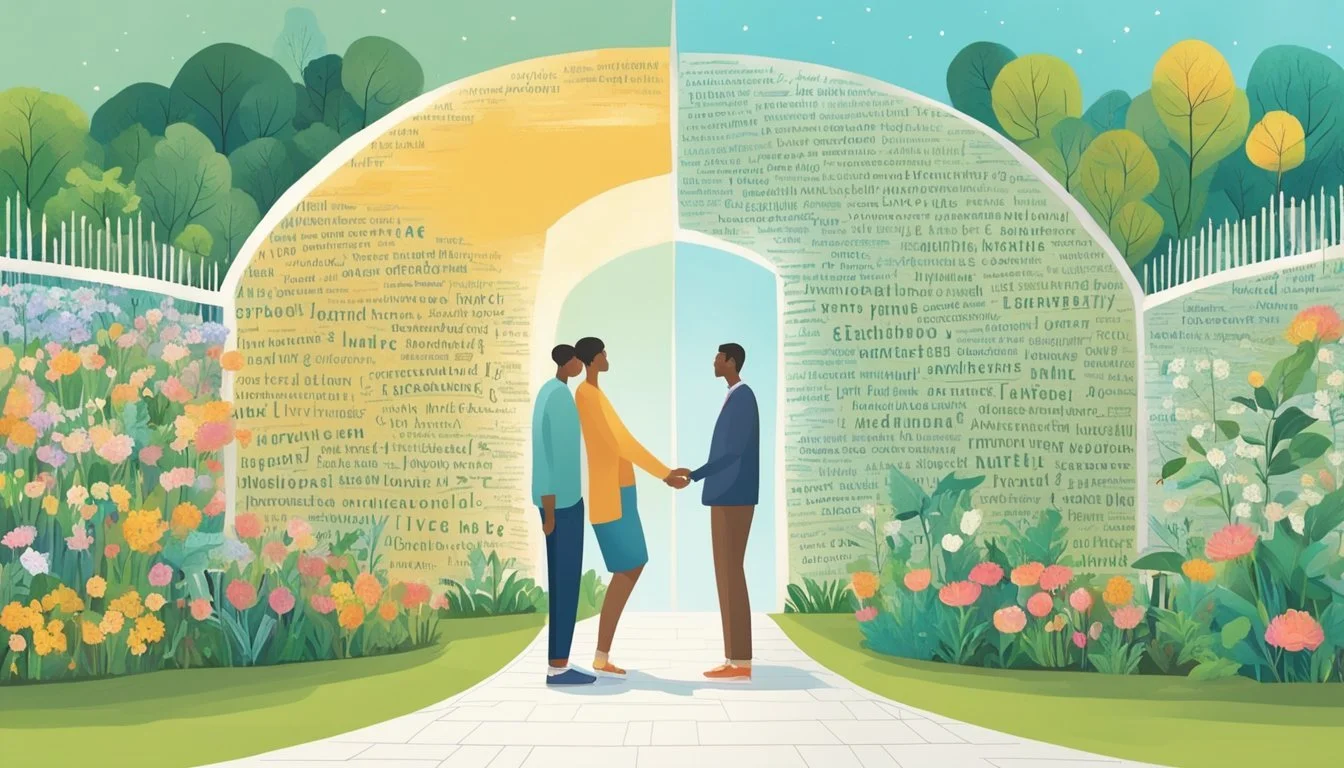5 Ways to Cultivate Empathy in Your Relationship
Strengthening Emotional Connections
Empathy serves as the cornerstone of healthy and fulfilling relationships. By truly understanding and sharing your partner's feelings, you can foster deeper connections and enhance mutual respect. Developing empathy not only strengthens emotional bonds but also helps in building trust and reducing conflicts.
Cultivating empathy requires intentional effort and practice. For those seeking to enhance their relationships, learning how to be more empathetic is essential. This guide provides practical strategies to help individuals nurture empathetic behaviors and attitudes in their partnerships, leading to more meaningful and supportive relationships.
1) Active Listening
Active listening is a crucial skill for enhancing empathy in relationships. It requires giving your full attention to your partner and genuinely hearing what they have to say. This specialized type of listening necessitates putting aside distractions like phones or background noise.
When actively listening, one should focus on the speaker's words, tone, and body language. This helps in understanding the complete message they're trying to convey. Eye contact is important, as it shows you are engaged.
Reflecting back what the speaker has said can also be beneficial. Statements like, "What I hear you saying is..." or "It sounds like you feel..." can confirm you understand their perspective. This technique not only validates their feelings but also ensures clarity.
Another aspect involves withholding judgment and not immediately jumping to problem-solving mode. Instead, allow the speaker to express themselves fully before offering any advice or feedback. This makes the speaker feel truly heard and respected.
Practicing patience is key. Listening in this manner might require slowing down the conversation. Giving ample time for thoughts and feelings to be fully expressed can deepen the connection between partners. Engaging in active listening can transform interactions, making them more meaningful and empathetic.
2) Show Affection Regularly
Showing affection is crucial in any relationship. Regular expressions of love can help partners feel valued and connected. Simple acts like holding hands, hugging, or giving a quick kiss can make a significant difference.
Physical touch isn't the only way to show affection. Verbal affirmations also play a vital role. Compliments, words of appreciation, and even playful teasing can make your partner feel cherished.
Small gestures can also express affection effectively. Surprise notes, thoughtful gifts, or even preparing a favorite meal can help strengthen the bond. These actions demonstrate attentiveness and care.
Consistency is key. Regularly showing affection ensures that your partner feels continuously appreciated. This consistent effort can build a strong foundation for emotional intimacy.
For more insight on how to be more empathetic in relationships, consider exploring this helpful guide on Psych Central. Additionally, Verywell Mind highlights the importance of empathy in building stronger connections.
3) Use 'I' Statements to Express Feelings
Using 'I' statements to express feelings can significantly enhance communication in relationships. Instead of blaming or accusing, start sentences with "I feel." This approach helps in taking ownership of emotions and avoids making the other person defensive.
'I' statements can promote a healthy dialogue. For example, instead of saying, "You never listen to me," try, "I feel unheard." This makes the conversation less confrontational and more about finding a resolution.
This method encourages vulnerability, which can deepen emotional connections, fostering empathy. When partners see each other's genuine feelings, it becomes easier to understand and respond empathetically.
Effective use of 'I' statements requires practice. Staying honest and clear about one's feelings without exaggerating helps to keep the communication balanced and respectful.
4) Validate Their Emotions
Validating emotions is essential in creating empathy in a relationship. Recognizing and acknowledging your partner’s feelings helps them feel heard and understood. It shows that their emotions are valid and important, fostering a deeper connection.
Active listening plays a crucial role here. When your partner shares their feelings, focus entirely on what they are saying. Avoid interrupting or dismissing their emotions.
Use empathetic responses to show that you are engaged. Phrases like "I can see why you feel that way" or "That must be really tough" can make a significant difference. These responses validate their experience without judgment.
Non-verbal cues also matter. Nodding, maintaining eye contact, and mirroring their expressions can reinforce that you are genuinely listening. These cues convey empathy and acknowledgment even without words.
Take the time to reflect back what you’ve heard. Summarizing their feelings or repeating key points can ensure that you have understood their emotions correctly. It shows that you are truly engaged with their perspective.
By consistently validating emotions, partners can build trust and understanding. This practice fosters a safe environment where both individuals feel valued and supported. Such an environment is foundational to long-lasting, empathic relationships.
For more detailed information on validating emotions, consider reading about how empathy involves recognizing and validating feelings.
5) Engage in Shared Activities
Engaging in shared activities can significantly enhance empathy in relationships. When partners participate in activities together, it helps to build a stronger emotional connection. Activities like cooking together, taking a walk, or even playing a board game can provide opportunities for meaningful interactions.
These shared experiences foster a sense of teamwork and cooperation. Both partners start to understand each other’s preferences and challenges better. This understanding naturally leads to greater empathy, as both individuals become more attuned to each other's feelings and needs.
Moreover, engaging in activities together can serve as a stress reliever. It offers a break from daily routines and responsibilities, allowing partners to bond in a relaxed setting. Whether it’s a hobby or a new interest, these moments can create lasting positive memories.
Communication also tends to improve during shared activities. There’s a natural flow of conversation that can bring up topics that might not surface during regular daily interactions. This open communication further deepens the emotional connection and understanding between partners.
In essence, shared activities are not just about spending time together. They are opportunities to build a deeper, more empathetic relationship. The consistent practice of engaging in activities together can greatly contribute to the emotional health of the relationship.
The Importance of Empathy in Relationships
Empathy plays a crucial role in relationships by fostering emotional connections and mutual understanding. It helps create a strong bond and improves communication.
Building Emotional Connections
Empathy strengthens emotional bonds by allowing individuals to share and understand each other's feelings. When partners empathize, they validate each other's emotions, making them feel respected and valued. This forms the foundation of a supportive relationship.
Empathic behavior encourages prosocial actions and altruism, enhancing overall happiness. Partners who practice empathy tend to engage in selfless acts, which further strengthens their connection. This cooperation boosts forgiveness, reduces conflicts, and cultivates a nurturing environment.
Empathy also leads to greater emotional intelligence. By recognizing and responding to each other's feelings, partners can better manage their own emotions and reactions. This heightened emotional awareness contributes to a healthier, more balanced relationship.
Fostering Mutual Understanding
Mutual understanding is critical for resolving conflicts and maintaining harmony. Empathy enables partners to see situations from each other's perspectives, leading to more effective communication and problem-solving.
By actively listening and acknowledging each other's pain, as suggested by Verywell Mind, partners can create a safe space for honest discussions. This reduces misunderstandings and builds trust, essential for a lasting relationship.
Empathy also encourages mindfulness and self-improvement. Partners can work on their own emotional issues, as highlighted by Psych Central, fostering a more resilient and empathetic connection. This continuous growth helps prevent resentment and sustains mutual respect.
Common Barriers to Empathy
Empathy in relationships can be hindered by personal biases and miscommunication. Recognizing and addressing these barriers can foster deeper connections and understanding.
Overcoming Personal Biases
Personal biases can cloud judgment and limit the ability to empathize effectively. These biases often stem from past experiences, upbringing, or deeply held beliefs. It's crucial to identify and acknowledge these biases to move past them.
One effective way to overcome biases is to engage in self-reflection. By regularly examining one's own thoughts and reactions, individuals can become more aware of their prejudices. Seeking diverse perspectives and exposing oneself to different cultures and experiences can also help reduce biases.
In relationships, open and honest conversations about each other's backgrounds and viewpoints can foster mutual understanding. This approach encourages partners to see each other as individuals rather than through the lens of preconceived notions, thus enhancing empathy.
Addressing Miscommunication
Miscommunication is a significant barrier to empathy. When communication breaks down, misunderstandings can occur, leading to frustration and a lack of connection. Effective communication requires active listening, where individuals pay full attention to their partner without interrupting or planning their response while the other person is speaking.
Reflective listening, where one restates what the other has said to ensure understanding, can also be beneficial. This technique helps clarify messages and shows the speaker that they are being heard. Non-verbal cues, such as maintaining eye contact and using appropriate facial expressions, further support effective communication.
By creating a safe space for open dialogue and addressing any misunderstandings promptly, couples can build a foundation for empathy. This proactive approach helps prevent minor miscommunications from escalating into more significant issues.


